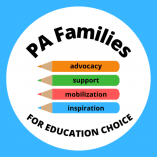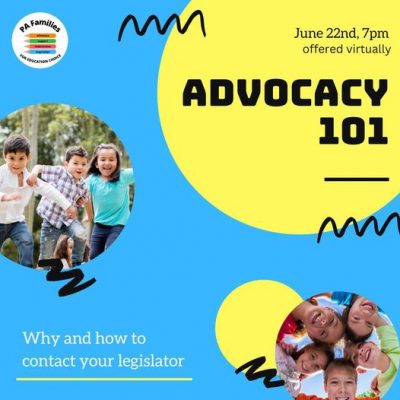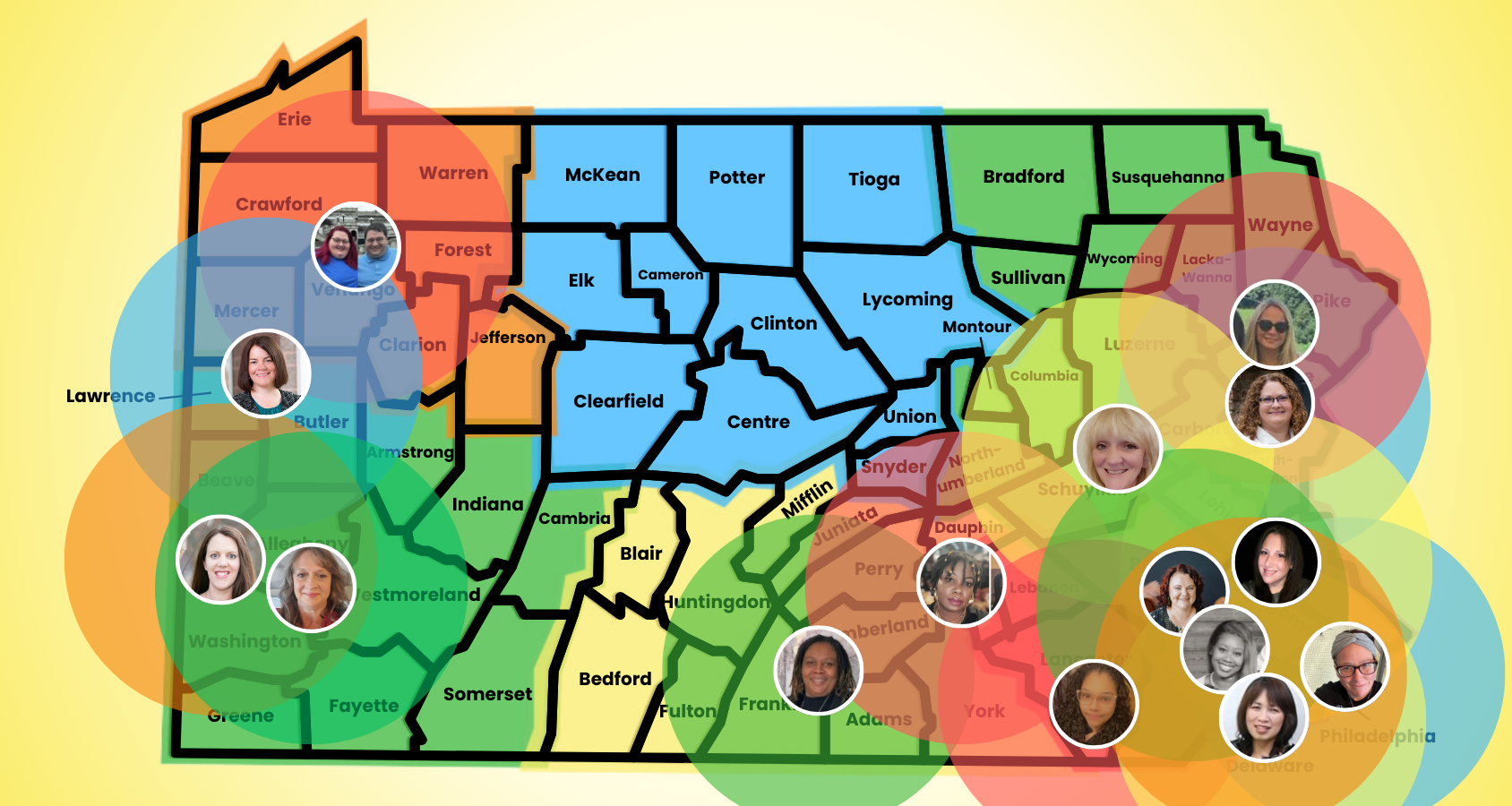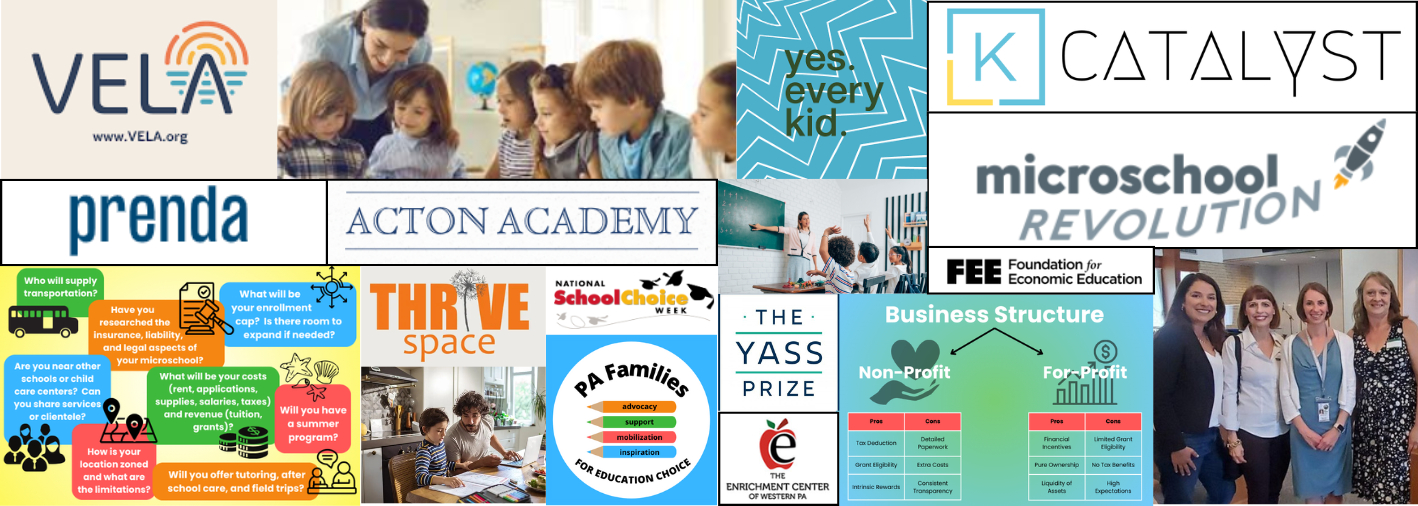Microschooling Toolkit
One-Pager


For many, the interest in microschooling doesn’t just come out of nowhere. Most recently, much of the microschool momentum arose from the COVID-necessitated, student-inspired, parent-run educational pod – a safe haven where children gathered to learn in a manner that best suited their families. Many of these families didn’t even know it – but they were starting a microschool community!
Microschools consist of home-based education styles, whether homeschooling families or even cyber schooling families, craving some type of outlet, structure, or community on a regular basis. Sometimes, the groups grow large and become more structured, and take the form of a “school” – but on parent’s terms and completely at will. Some microschools are run via volunteerism, and others have staff, payroll, and business-related costs. Some microschools are “free”, while others require a “fee” or “tuition”.
If you’re thinking about starting a microschool – welcome to the bursting educational entrepreneurship field! The Penn Graduate School of Education has a Master of Science in Education program , which it defines as preparation to “acquire the knowledge, skills and networks you need to create new schools, launch ed tech ventures, and drive innovation in educational organizations and corporations around the world.”
Sound exciting?
If you are still thinking about starting a formal microschool, ask yourself:
- What is my “why”?
- Do I like large groups or small groups; flexibility or structure; consistency or variety?
- Will you be hands on day to day and in what capacity – child-centered activities or managerial?
- Do you already have families who would participate? Would they be paid teachers or volunteers?
- What’s your vision? Project based, formal teaching by age group, one room schoolhouse, nature or arts inspired, faith-based?
- What curriculum will be used, or will each student bring their own?
- What community will you serve?
- What are the logistics? Will there be a defined day and time, or will the schedule be more “drop-in”?
- How will parents communicate with you and relate their child’s daily needs?
- What is your daily schedule going to look like?
Still thinking about starting a microschool? Now for the logistics! Here are a few starting points:
Resources to Help You Along the Way
Jump straight to:
Parents Seeking a Microschool for Their Child
KaiPod Learning
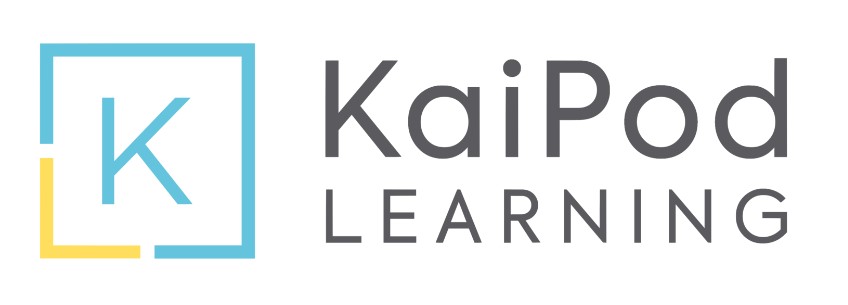

“KaiPod Learning is a network of in-person microschools where students learn at their own pace, explore their passions, and develop their skills to take on the world.”
“Students can meet in-person at a KaiPod Learning Center to learn together, collaborate, and socialize with the support of a dedicated KaiPod Learning Coach.”
“KaiPod Learning is designed for students in 3rd-12th grade. To ensure a small group learning environment, each learning pod is limited to a maximum of 12 students per day. Each pod is supported by an experienced KaiPod Learning Coach — a 12:1 ratio!“
“While at the KaiPod Learning Center, students work on their curriculum with the support of their KaiPod Learning Coach, participate in tailored enrichment activities, and socialize with their peers.”
Thrive Space


“Thrive Space is a creative micro school option for developing and inquisitive minds. Their activities and programs provide a place for children and their families to seek alternative and supplemental education options in the spirit of life learning.”
“Your child will learn in a secure, creative, and positive environment that is working towards building a community of like-minded families and individuals. While secular in nature, Thrive Space is an inclusive group that thrives on creating critical thinkers. “
Thrive Space’s focus is on enrichment, social, and practical life options, hoping to make these things accessible to all kids.
The Enrichment Center of Western PA


“At The Enrichment Center of Western PA, our desire is to provide an educational environment that benefits and blesses homeschooling families and honors the Lord Jesus Christ in the process. We want to come alongside and support families with the freedom to school as they see fit and provide a community for homeschool students to thrive!”
Working together with HSLDA and CHAP, The Enrichment Center of Western Pennsylvania, formerly referred to as “E-Day,” is a non-profit organization serving the Pittsburgh, Cranberry Township, Beaver, Butler, Eastern Ohio and surrounding areas.
They are a “unique family-centered cooperative offering both upper level and cooperative level classes in a fun, engaging environment. Many of their classes have a Christian orientation but non-Christians are welcome.”
Microschool Consultants for Those Seeking to Start Their Own
KaiPod Catalyst


“KaiPod Catalyst is an accelerator for entrepreneurial educators to launch their own microschools in their communities.”
“KaiPod Catalyst invests in Founders with a strong desire to build new learning pathways and a passion for personalizing learning for students. Teachers, parents, community leaders, and even working professionals can start building a microschool part-time (alongside another profession) and make it a full-time role when the school launches.”
Microschool Revolution


“Microschool Revolution connects worthy microschools with seed money to grow.”
Microschool Revolution connects you to funders who want to invest in microschools like yours, give you advice for running the business side of the school, and answer any questions you might have about the microschool educational model.
“Today’s economy demands:
Innovators. Problem solvers. Creative thinkers. People who are passionate and engaged.
Not broken spirits, whipped into conformity rigid curriculum and standardized testing.”
National Microschooling Center


“The National Microschooling Center is a nonprofit resource hub and movement-builder committed to advancing the growth, health and evolution of the microschool movement to live up to its fullest potential.”
“If you are looking for a microschooling center for your child, reach out to the National Microschooling Center and they will talk with you about what your priorities are, connect you with other local parents, and help you find a good match!”
School Startup Course


“The School Startup course, designed by veteran educational entrepreneurs, is the blueprint that equips leaders with the knowledge and confidence to serve their communities for years to come.”
This course includes The Unconventional Educator’s Blueprint (a step-by-step Playbook), 8 expert webinars, and over 45 downloadable templates. Combined with their BLOCK framework, they take what is foreign and make it familiar to serve you and your learners well.
Vela Education Fund


“By providing early capital, access to a thriving community of entrepreneurs, and connections to resources and support, VELA is accelerating the exploration of new frontiers in education.”
“We believe that sustainable change in education will come from the ground up.
Parents should be empowered to lead their children’s educational journey. Founders should be empowered to deliver dynamic education solutions for families.”
Structured, “Pre-Built” Microschool Models
Acton Academy


“Acton Academy admits learners and affiliates of any race, color, national and ethnic origin to all the rights, privileges, programs, and activities generally accorded or made available to students via online school presence. It does not discriminate on the basis of race, color, national and ethnic origin in administration of its educational policies, admissions policies, scholarship and loan programs, and athletic and other school-administered programs.”
- Adaptive game-based programs for core skills
- Socratic discussions to strengthen critical thinking
- Hands-on real world projects
- Life changing apprenticeships
Prenda


“We help you empower the learners in your life by providing an effective microschool operating system, a learning model that puts the child at the center, and an inspiring and supportive community.”
“Prenda provides a K-8th curriculum and microschool management platform that makes it easy for inspiring, caring grownups to start microschools that help kids love school again. If you believe that every child should be seen as a unique individual, be allowed to grow at their own pace academically, and have the opportunity to discover their personal purpose for learning, there’s a good chance you’d be an amazing microschool guide. Your students (and their parents) are going to love you!”
Funding
VELA


The VELA Founder Network is an entrepreneur community that provides alternatives to conventional schooling, believing that parents should lead their children’s educational journey. This fund is for founders and organizations operating in small learning environments or programs that offer direct services or support for their unconventional schooling space. To be eligible, the organization must satisfy a list of requirements, which can be found on their website.
Microschool Grants
Change Happens Foundation
The Change Happens Foundation is aligned with the pillars of environmental stewardship, education, and human services. Dedicated to forging a brighter future, this foundation invests in initiatives that catalyzes systemic and sustainable solutions to environmental challenges, aiming to ignite a ripple effect of change for a healthier, more resilient world. Organizations can apply for a variety of grants through their website.
Charles Lafitte Foundation
501(c)(3) organizations can apply for this grant, which looks to empower organizations to achieve long term stability. Placing preference on underwriting specific projects with distinct goals, this grant targets organizations that will have a notable impact and make a material difference, looking for creativity, innovation, and initiative.
Innovative Technology Experiences for Students and Teachers (ITEST)
This grant supports applied research and development focused on education in careers in information and communication technology and STEM through technology-based learning experiences. With millions of dollars available through this grant, organizations with a STEM focus could greatly benefit from this grant!
Project Lead the Way (PLTW)
This grant is to be used to cover the costs of your PLTW STEM program implementation. When awarded this grant, an organization will be covered for participation fees, professional development, and equipment and supplies so they can implement this STEM program into their curriculum.
Saxena Family Foundation
The mission of Saxena Family Foundation is to advance inventive and effective ways of promoting STEM education in the U.S., empowering young women so they have equal rights. This grant is specifically for non-profit organizations and are not to be used for operating expenses, capital campaigns, existing deficits, lobbying, sectarian, religious or fraternal purposes.
Snapdragon
Snapdragon Book Foundation awards a variety of grants to all types of schools across the country. This grant is to be used for books for school-aged children through libraries, processing fees from book vendors, reference materials for student use, and magazine or newspapers subscriptions. School libraries serving children PreK-12 are eligible.
The Mockingbird Foundation
The Mockingbird Foundation is for music education, providing competitive grants, emergency-related grants, and tour-related grants. A two-tiered grant application process is used, favoring applicants who recognize the importance of music education for its own sake.
U.S. Department of Education
The U.S. Department of Education offers 3 kinds of grants: discretionary grants (awarded using a competitive process); formula grants (uses formulas instead of an application process); and student loans or grants (for college students). Organizations can use this as a source for other grants as well, as it provides an A-Z list of all grant programs.
Yass Prize
The Yass Prize finds, rewards, celebrates, and expands education organizations from every sector, in every state. Their goal is to accelerate education opportunity for all students and freedom for parents and teachers across the country.
Legal Insight
yes. every kid. foundation
“The yes. every kid. foundation. legal team helps education entrepreneurs, such as those starting new learning environments or those managing existing environments, such as learning pods, microschools, hybrid schools, and homeschool co-ops. We provide support to help edupreneurs overcome regulatory hurdles and provide guidance on how to structure their business. “
yes. every kid. foundation helps edupreneurs think through and overcome these common challenges and more:
- Education laws: Compulsory attendance, private school laws, homeschool laws
- Site-related challenges: Fire, health, safety; zoning; childcare regulations
- Understanding business formation: Nonprofit, for-profit, organization type, employee classification
